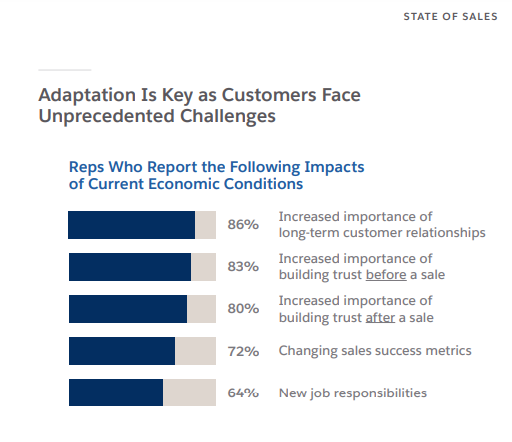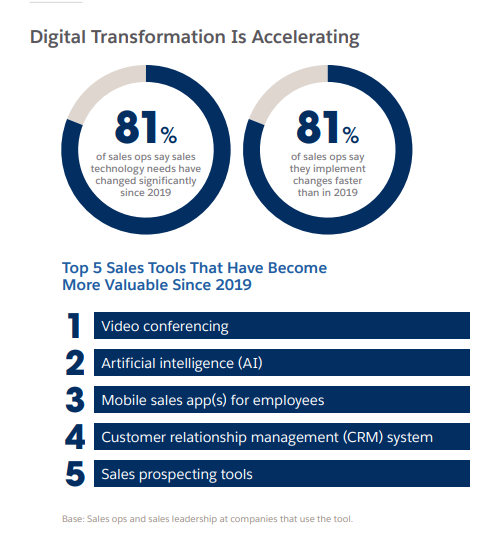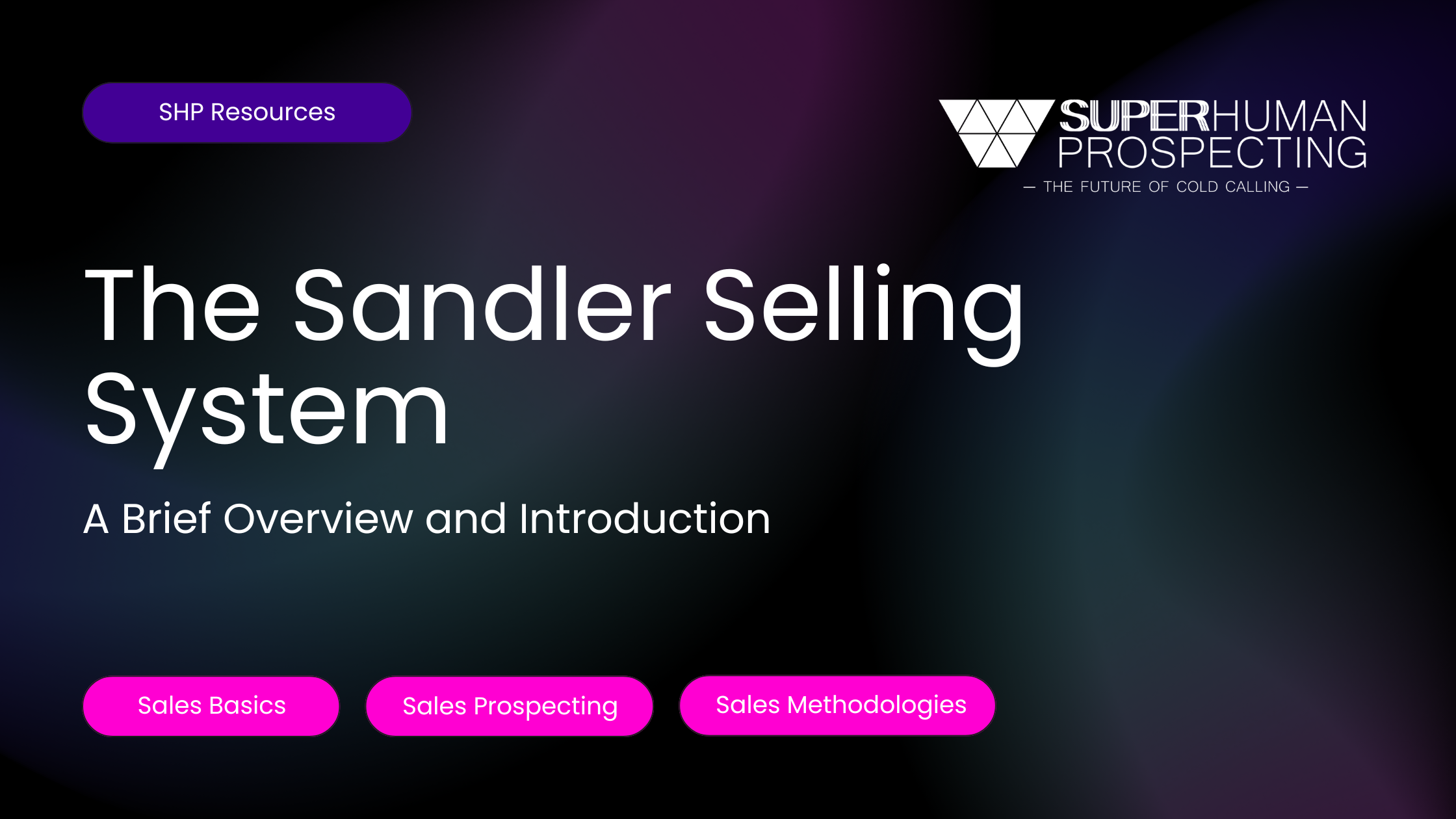In May 2020, Salesforce conducted a survey that reported 61% of salespeople were confident their jobs would never be the same. Now, almost a full year later, we have a clearer view of the future and a better understanding of the sales industry for the rest of 2021.
If there’s one thing we’ve learned over the past year it’s that there’s a lot of bad sales advice out there. All throughout the pandemic, it was “Do this, don’t do that.” Influencers, LinkedIn stars, and self-proclaimed “Sales Ninjas” declared to know the right answer to solving all of your sales problems, pushing down the (actually) helpful information you were seeking the entire time.
To help make up for it, we’ve analyzed some of the best sales advice on what’s working so far in 2021 from our favorite no-bull sales leaders and entrepreneurs.
Building More Trust in Sales
Sales strategies have been evolving for decades, consistently changing to meet the needs of our clients and customers. However, the pandemic has definitely shaken up customers’ circumstances with unprecedented scale and speed. As a result, 79% of sales reps say they’ve had to quickly adapt to new ways of selling. Between new responsibilities, new metrics, and new ways of selling, one thing is for certain – TRUST is key.

Building trust has always been important. Consumers are increasingly wary of salespeople and selling tactics, which is why the importance of building trust and sales ethics is higher than ever before as customers and prospects keep their limited resources close.
A recent Edelman survey confirms the value of trust:
- When it comes to purchasing, loyalty, and advocacy, consumers are over twice as likely to go with a brand they’ve trusted for a while versus one they don’t fully trust.
- While social impact is important (38% base trust on this), the customer experience (56%) and product experience (87%) are still paramount.
“Building trust is about acting in their best interest and having good intentions,” says Ryan Pereus, Founder of Superhuman Prospecting. “Go the extra mile whenever possible and add value upfront to create long-term relationships.”
- Will you make the extra revision for them?
- Will you hang on the call with your client/customer for the extra 5 minutes to give them everything?
- Are you actively listening to what they are experiencing?
His best sales advice: “If we speak to humans as they are, understanding what’s of importance and priority to them, we can provide an experience that builds trust again faster than any other source.”
Most sales professionals are automatically at a disadvantage because our role is to ‘sell’ and the customer knows it. Our behaviors have to clearly show our openness and collaboration, without necessarily agreeing in some cases. Ryan states, “It’s not just about that first sell, it’s about always selling customer satisfaction.”
Treating B2B More Like B2C
There is a lot of back and forth on this one due to the overall process, but it’s safe to say, companies that quickly adapt to new ways of understanding and connecting with their customers will always be ahead of the game. As B2B leaders, we need to realize that businesses don’t make the decisions – people do. Humans want to be seen and heard throughout the process.
Marcus Murphy, Co-Founder, CEO at The Five Percent believes that modern sellers create internal partnerships and focus on making that person the champion of the story by helping to solve their problems. He says, “It doesn’t matter how big the brand is… human beings are still sitting in the seats.”
We must stop the cold, detached style of selling. We must listen, ask better questions, recognize their true needs, offer value that solves root issues, and build a tailored experience that focuses on relationships.
In B2C, customers are seen as customers, not “leads.” Take this same human aspect and bring it into your B2B processes.
Marcus recommends:
1. Researching their position.
2. Finding out how their personal themes tie into their role.
3. Finding out what would make them look like a hero in their role.
Marcus adds, “It’s realizing that another human sits on the other end of that phone, email, Inmail, and post. And that human being doesn’t care about you… they care about themselves, their job, their responsibilities, their goals, and how they will achieve them.”
Providing a Better Sales Experience
In 2021, sales is about knowing your customer and providing a good experience from the initial contact to the final delivery. Sales Trainer and Best Selling Author of Selling From the Heart, Larry Levine, says it’s about forming a bond between you and your clients that’s based on more than just a purchase of products.
“Customer retention, loyalty, and the service experience you provide are the foundation to your sales survival,” Larry said in a recent post on LinkedIn. He continued, “It’s about creating a connection based on trust, credibility, and mutual respect. Even the most satisfied clients require your consistent attention and care.”
Successful sales professionals understand the importance of balancing and maintaining outstanding relationships with customers throughout their entire journey. His advice: Never take a single client for granted, especially in a world where there is much choice.
When you get to know your clients inside and out, you can personalize the attention you give them. And when your input is appreciated, it’s less likely they will engage with your competition. And although we are making economic progress, it’s important to remember that your buyers are still finding themselves in vulnerable situations.
You can’t assume your clients know the value you bring. Put yourself in your client’s shoes and see the world through their eyes. Larry suggests grabbing a sheet of paper, and asking yourself two main questions:
1. How do I help my clients gain a competitive advantage?
2. What is my client’s perception of value in working with me?
Use this information to personalize their experience and provide a better client journey. The more you learn about their situation and perspective the more you can speak directly to their needs.
Balancing Human Vs Technology
According to Salesforce’s State of Sales report, 81%of sales ops say sales technology needs have changed significantly since 2019. 81% also surveyed as making decisions quicker since 2019, with the help of some valuable tech tools.

“There’s so much opportunity for sellers right now around using technology. Between AI and automation, there’s so much power behind that. Many sellers have been reluctant to use that kind of capability within their CRM systems or other systems because they feel like it’s about replacing them as salespeople. And it isn’t,” says Tiffani Bova, Global Growth Evangelist at Salesforce.
The new power couple? She says, “Human and Technology.” And she’s not alone. It’s no secret the pandemic surged the digital transformation forward. When we combine these two powerful forces we get the best of both worlds.
The human aspect is always going to be necessary because as humans, we want that connection and interaction. But also, we have these amazing advances in technology that can help us focus on better data and more important aspects of the sales process.
Tiffani notes, “Some of our State of Sales research in the past showed 65% of a seller’s time is spent on non-selling activities. Imagine if we could give back five or 10% of that time and focus them on the actual art of selling and closing business.” This is exactly what you can do with the right technology and the right processes behind it. It’s important to up-skill and re-skill in the digital world to stay ahead in 2021 and beyond.
Especially as we begin to align sales and marketing. Greg McBeth, CEO, and Co-Founder at Melier notes that while sales have been slow to adopt new processes like AI and automation, marketing has taken off much quicker. It’s not much of a surprise, he says, “Sales and marketing have always had different ways of approaching the same problems. This is what has led to the difficulty in coordinating account efforts in strategic ways.”
Using AI, sales can gather and interpret data about their clients’ buying trends – they can then use this new information to launch more successful marketing campaigns. Gartner research predicts that 70% of customer experiences will involve some kind of machine-learning component in the next three years. So, the first sales teams to adopt AI will have a massive advantage in the near future.
Sparking Your Creativity
2021 is the time to flex your creativity. “It’s key in prospecting,” says Jason Bay, Outbound B2B Sales Coach. Creativity doesn’t need to be complicated.
His best sales advice: “Most people overdo it. They send a video, but with a confusing walkthrough of their software, the prospect has never seen before. They use a diagram/image embedded into the email, but the information looks like unimportant random numbers thrown together. Or they use a meme with a message that’s such an inside joke it doesn’t land with the prospect. In many ways, creativity is more about keeping it simple.”
Creativity in sales isn’t new, but it’s definitely more powerful than ever. In today’s noisy digital world, you have to stand out. That means being more creative, more interesting, more helpful, and more human. Dale Dupree, Leader of the Sales Rebellion, adds “It’s not about being cutting edge, it’s about getting your busy buyers’ attention.”
When looking to start a creative outreach method, Dale advises staying consistent, creating a cadence, and being authentic. “Being creative doesn’t just crack the code on how to prospect better, it builds familiarity, relevance drives curiosity, and interrupts typical patterns.”
Think about your target audience – remain respectful and do your research. Be sure to come up with something they can appreciate.
Keeping Your Team Motivated
“We’ve just finished an unimaginably difficult year,” said Nancy Halpern, founder of Political IQ, a New York City-based management consulting firm that helps organizations resolve office politics. How you motivate and support your team will set the tone for the next six months.”
As some offices move hybrid and others stay remote – one thing is certain. It’s vital to keep your employees engaged and motivated. Her best advice: ask open-ended questions. “If they say everything is fine, encourage them to be honest by sharing your own concerns and challenges. If you’re vulnerable and candid, they will respond in kind,” she noted.
Co-Founder of SOTA Partners, Neal Taparia believes communicating a vision once isn’t enough to motivate or inspire your team. “A role of a leader is to constantly show your team the business is progressing towards its long-term vision. It can be a weekly meeting or email. Take the effort to regularly show them how everything ties to your mission.”
Make sure every employee feels they have a part. When they understand that their work matters, motivations rise and so does productivity. “It doesn’t have to be complicated,” says Neal. “You can hold team meetings or send video messages or Slack updates. Do whatever you think is best for the dynamic of your team to effectively get your message through.”
Investing in Professional Development
Since the start of the pandemic, we’ve seen a rise in sales professionals taking more control over their professional development. From joining professional networks to engaging in leadership-development programs, or mentorships, going virtual gave way to more development opportunities for those looking to gain valuable skills to advance their careers.
Participating in these types of networks or structured programs can help employees gain valuable skills and the confidence needed to advance in their careers. “Their involvement can also provide professional exposure for employees, potentially opening up pathways to new clients or customers, notes Michael Timmes, Human Resource Consultant.
Also a fan of cross-training employees, Michael says this type of training gives employees a deeper understanding of the business and how each department works together to accomplish goals. “It can provide a disruptive spark that refreshes drive, which leads to innovation through fresh perspectives and new questions. Additionally, it can add a level of protection to the workforce that can be useful when external disruptions arise,” he adds.
He suggests that business leaders should spend adequate time researching and compiling a list of options for their workforce in order to make more personalized recommendations. This will give structure to your employee and serve the company by ensuring the individuals at your company are growing and evolving in a mutually beneficial direction.
In Conclusion
Because of confirmation bias, we tend to not question what we already agree with. This can be a problem if we mindlessly share and believe sales advice that can be ineffective at best and harmful at worst. Just because a LinkedIn influencer says it and tons of people agree – doesn’t make it the best sales advice out there. If there was advice you’ve said or believed in that was considered bad advice, use that as an opportunity to learn!







